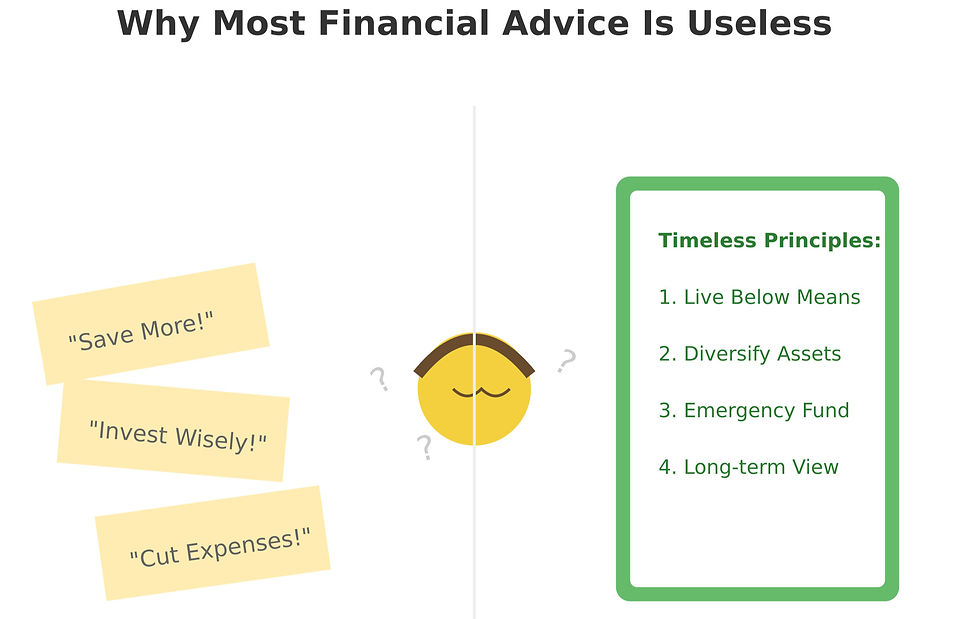Why Most Financial Advice Is Useless (And What Actually Works)
- Hersh Rajput
- Feb 19, 2025
- 4 min read
Updated: Mar 24, 2025

There’s no shortage of financial advice.
Everyone has an opinion—your neighbour, that guy on Twitter, your uncle who gets tips from whatsapp groups. True story - I’ve even had a taxi driver tell me what stocks to buy. The next day this happened.

The problem? Most of it is either too generic, outdated, or just plain wrong.
Yet, people follow it blindly. They invest on the basis of tips (the last 4 years has made everybody a Jhunjhunwala), use leverage too much or too often, & have no asset allocation. Meanwhile, wealth creation remains a distant dream.
So, what are the typical problems? And more than that - what are some timeless investment strategies that always work?
The Problem with Generic Financial Advice
A lot of financial advice sounds good but doesn't work in real life. Why?
It’s Oversimplified for the Masses
"Live below your means." "Save 10% of your income." "Buy low, sell high."
These are not wrong, but they lack context. A software engineer in Bangalore and a farmer in Latur have completely different financial realities. Yet, they’re told to follow the same principles.
🔹 Reality Check: If you're earning ₹30,000 per month, saving 20% might not be realistic. But if you're making ₹5 lakh per month and still saving only 10%, you're probably doing it wrong.
It Focuses Too Much on Expenses, Not Enough on Income
Most advice assumes you already make enough money and just need to manage it better. But for many people, income itself is the problem.
🔹 Reality Check: Cutting out a ₹350 Starbucks coffee won't make you rich (might enable you to spend it on better stuff imo). But doubling your income? That might.
Instead of obsessing over budgeting and going crazy after hyper efficiency focus on skill-building, career growth, or side hustles. Typically most people start earning big money after 6-7 years into their careers, when they find their footing, become stable and have some kind of path about what they want to do.
3. Most Advice Ignores Asset Allocation (The Real Wealth Builder)
People either go all-in on stocks (too risky) or hoard cash in fixed deposits (too safe). The real key? Asset allocation—spreading money across equities, debt, gold, real estate, and cash.

Studies show 90% of investment returns come from asset allocation, not stock picking. A simple rule: More equities when young (70-80%), shift to safer assets (bonds, gold) as you age.
🔹 Reality Check: Markets are unpredictable, but a well-diversified portfolio ensures steady growth while protecting against crashes. Don't chase hot stocks—focus on smart allocation.
Identifying Noise vs. Valuable Insights
With so much financial content out there, how do you separate what’s useful from what’s just noise?
Watch Out for Extreme Opinions
a. "Crypto will replace all money." (Unlikely.)
b. "Gold is the worst investment." (Tell that to someone who held gold in 2011.)
c. "The stock market is a casino." (Only if you treat it like one.)
Good financial advice is balanced. It acknowledges uncertainty, focuses on principles, and doesn’t rely on clickbait predictions.
2. If It Sounds Too Easy, It’s Probably Wrong
a. "Turn ₹10,000 into ₹10 lakh in a year!"
b. "This one stock will change your life!"
c. "Invest in my course and retire early!"
Wealth creation via investing is slow, boring, and requires discipline (Yes, it's fun, crazy & requires 100x discipline if you are an entrepreneur). There are no shortcuts to investing—only sound strategies applied consistently.
3. Follow Those Who Have Skin in the Game
Morgan Housel, Mr. Parag Parikh, Nick Maggiulli — these are people who invest their own money based on what they preach.
Compare that to a random YouTube "expert" with no investment track record. Whose advice should you trust?
Follow people who do what they say, not just those who talk about it.
Timeless Money Principles That Actually Work
Compounding Is the Most Powerful Wealth Tool
Warren Buffett made 99% of his wealth after the age of 60. Not because he found some secret stock, but because he started investing early and never stopped.
"The best time to plant a tree was 20 years ago. The second-best time is now." The same applies to investing.
🔹 What to Do: Start building the habit of saving and investing.
Asset Allocation > Stock Picking
Instead of trying to invest as per the flavour of the season ( crypto in 2020 - 2022, stocks in 2022 - 2024), focus on diversified asset allocation— across investment products and asset classes as per your risk profile.
🔹 What to Do: If you're new to investing, start with building an emergency fund, invest small amounts in an index fund like Nifty 50. If you have time and knowledge, pick individual stocks.
Avoiding Stupidity Is More Important Than Chasing Genius
Charlie Munger put it best: "All I want to know is where I’m going to die, so I never go there."
Most people don’t need to find the next multibagger stock—they just need to avoid big financial mistakes like: ✔ Taking massive loans for depreciating assets (fancy cars, expensive phones). ✔ Trading emotionally (buying high, selling low). ✔ Investing in things they don’t understand.
🔹 What to Do: KISS! (Keep it Simple, Silly). Your first step to wealth isn’t making great investments—it’s avoiding dumb ones.
Automate Your Wealth-Building Process
The best investors remove emotions from investing. They don’t panic during crashes or get greedy during rallies—they stick to a system that runs on autopilot, ensuring consistency over time.
🔹 What to Do: Set up automated investments—monthly SIPs, auto-debit for savings, and pre-planned rebalancing.
Final Thoughts: Think Long-Term, Act Today
Most financial advice fails because it’s generic, outdated, or impractical. Instead of blindly following trends, focus on timeless principles:
✔ Earn more, don’t just save more.
✔ Focus on asset allocation.
✔ Separate signal from noise—follow experts who “do”, not hype.
✔ Let compounding do the heavy lifting.
✔ Avoid stupidity first, then chase greatness.
There’s no one-size-fits-all formula. But if you play the game right, wealth creation is not just possible—it’s inevitable.
So, what’s your next money move? 😊



Comments